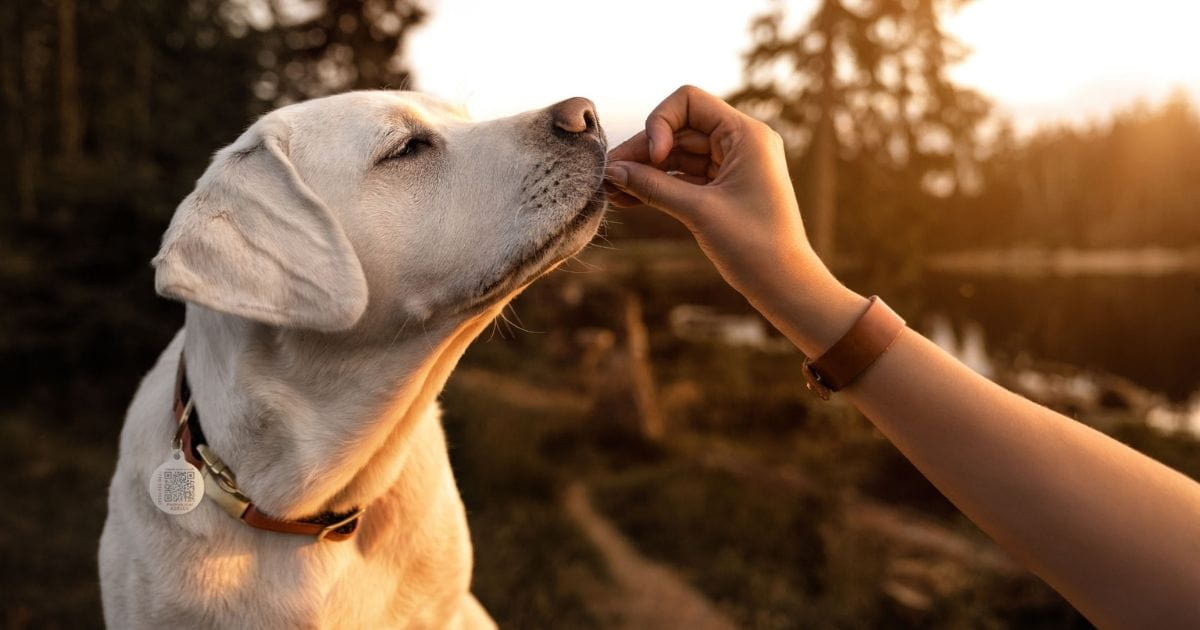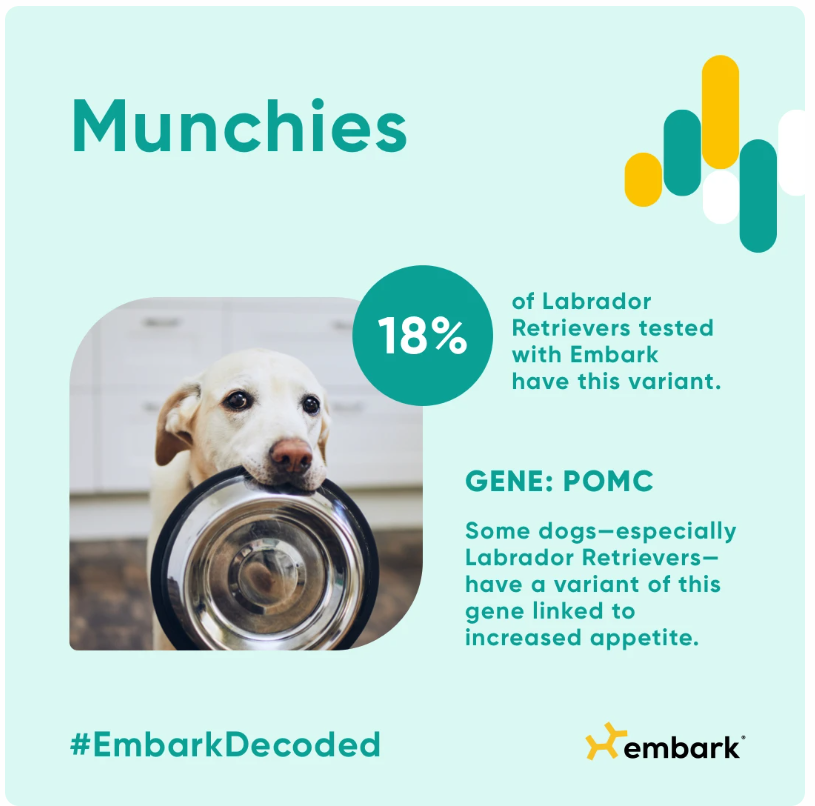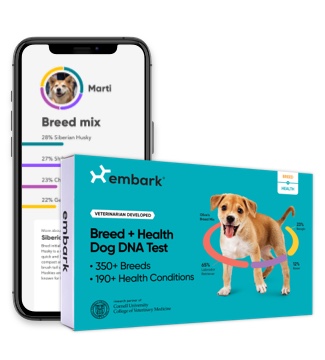This is a featured guest article from Embark Veterinary, the world leader in dog genetics with a mission to end preventable disease in dogs by providing dog DNA tests that enable pet owners to learn about their dog’s breed, ancestry, and health - all with a simple cheek swab.
Is Your Dog Obese?
Let's chat about an important topic that's often overlooked, but crucial to your doggo's health - obesity. Alarmingly, over 56% of dogs in the U.S. are overweight or obese, according to the American Kennel Club (source). This isn't just about them not fitting into their cute Halloween costumes; it's a serious issue that can lead to heart disease, diabetes, and joint problems.
Addressing this early in your dog's life is key to preventing it from becoming a health risk. While regular walks and watching their food intake are vital, it's also important to remember that some breeds, like Pugs (64% of which are diagnosed as obese), may have a genetic predisposition to weight gain (source).
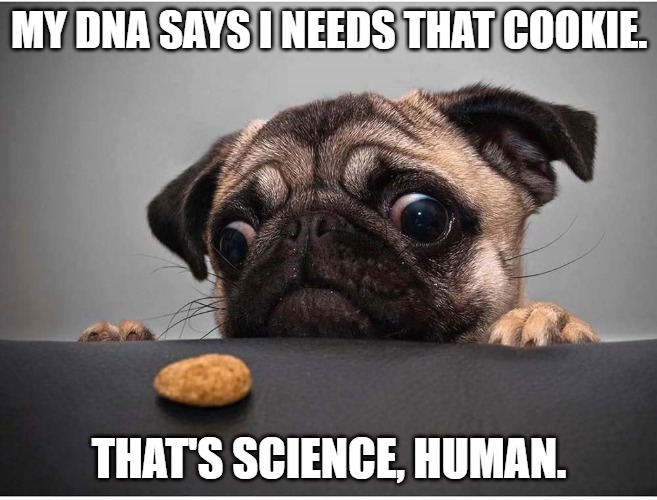
How Do I Know If My Dog is Obese?
Unfortunately, some breeds' fur, height, length and even shape, can make it difficult to determine an overweight dog by sight alone. This means you may not realize your dog is starting to pack on more pounds than they should until it's too late. The scale goes from 1-5, with 1 being very thin and 5 being severely overweight. You probably are familiar with the dreaded BMI used for humans, and there are similar scales used for canines.
Canine Body Composition Scoring
The Body Condition Score or BCS for short, is a little bit more complicated than a human BMI because of how much variation there is in different breeds of dogs (or cats). And to make matters even MORE confusing -- there are two scales that veterinarians use. Yay!
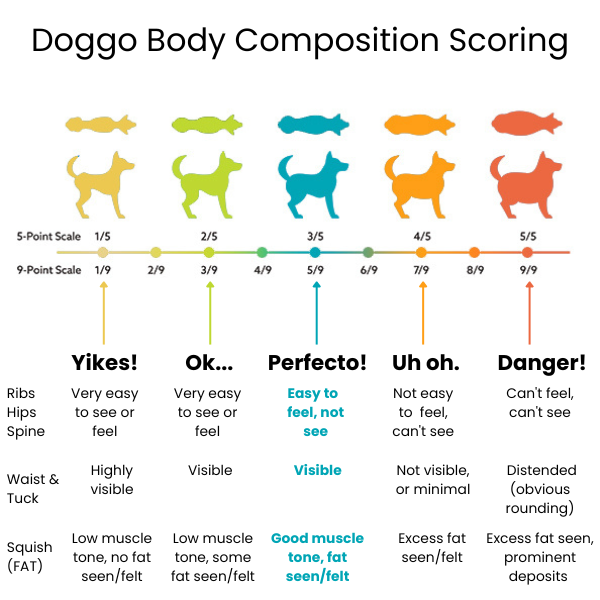
One scale is a 9-step scale and the other measures from 1-5. So a BCS of 5 could mean ideal (on the 1-9 scale) or mega-chonk (on the 5-step scale).
The easiest way is to look at your pup from above - do you see an hourglass shape or a bulge around the middle? View, too, from the side -- can you see a nice, clear "tuck" between their chest and hind legs? Finally, run your hands firmly along your dog's waist and ribs -- you should be able to feel their rib cage with a little bit of pressure. If you can't feel your dog's ribs, and instead feel fat tissue, you have an overweight dog.
Dangers of an Obese Dog
Pet obesity prevention is largely on the shoulders of the pet parents. Most dogs we know personally are food (or yummy treat) motivated. Table scraps, extra treats, and skipping your dog's daily exercise because you are just not in the mood can all be contributing factor to a dog putting on an extra pound or four. And though "food is love" feels loving, letting them overindulge simply isn't loving in the long run.
The dangers of carrying extra weight on your dog are very real. Not only can your dog's weight issues lead to joint pain and a decreased lifespan, but some breeds like Labradors seem to be predisposed to developing obesity due to their genes (source).
Dog obesity can also lead to pancreatitis, diabetes, and even cancer. And, just like humans, high blood pressure, difficulty breathing, and just a general decreased quality of life are common results of obesity in dogs.
How Can I Help My Dog Lose Weight?
Check-in with a Vet
It's important to contact your veterinarian if you suspect your pup is overweight or obese. Your vet can help you formulate a weight loss plan and determine an appropriate exercise regime for your dog.
Don't have time or can't quickly get into a local vet? Check out PetHub's Wellness Tools, where you can affordably speak with a vet anytime, anywhere. Be sure to ask questions about food portion control, treats (types and frequency), toys and supplements - all of which could contribute to excess weight gain. Wellness Tools also offers a Food and Treat finder tool that can help you snag food options that will help with weight loss.
Keep a Food & Exercise Journal
Keeping track of your dog's diet and exercise regimen is essential - write down the kinds and amounts of food that they consume, as well as their activity levels. Also, using a measuring cup or food scale is critical. You may be accidentally feeding your dog more than you realize -- too much caloric intake can quickly lead to a few extra pounds.
Consider getting a collar activity tracker to help you keep an accurate accounting of their exercise levels. Regular exercise can make a huge difference. Keeping this journal will help you to identify any potential issues or patterns that could be contributing to a weight issue.
Track and Monitor Progress
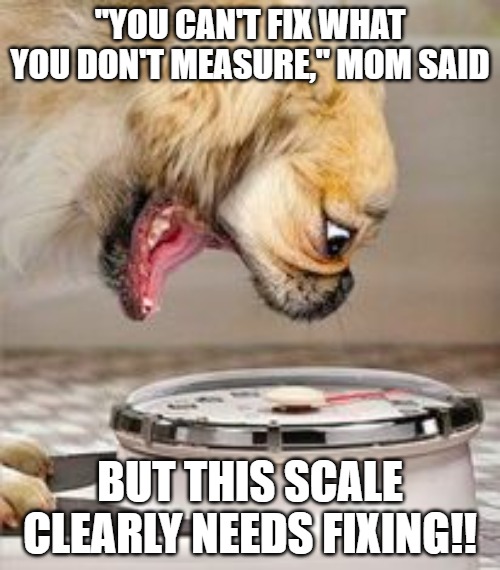
Weigh your dog regularly (ideally every 1-2 weeks) and monitor their progress. Slow, steady weight loss is the goal here. It can take months for some smaller dogs to lose even a few pounds. But every bit of excess body weight you help them remove will improve their quality of life and have positive health effects.
Check their Genetics
Sometimes, even after all of our best efforts, some dogs are just prone to obesity. If you're concerned about your dog's genetic makeup, consider investing in a DNA test for dogs - like Embark. Yup, that's right - you can now find out how your pup’s genetics are playing a role in their chunk factor.
Embark Veterinary can provide this information with a simple cheek swab and lab test, providing you with insights into your doggo’s breed make-up, ancestry and any genetic health risks so you can take steps to prevent issues before they arise.
How Genetics Influences Eating Habits
Genes influence the way we, and our pets, eat. For example, research has shown that some dog breeds are more likely to consume larger volumes of food than others due to their genetics.
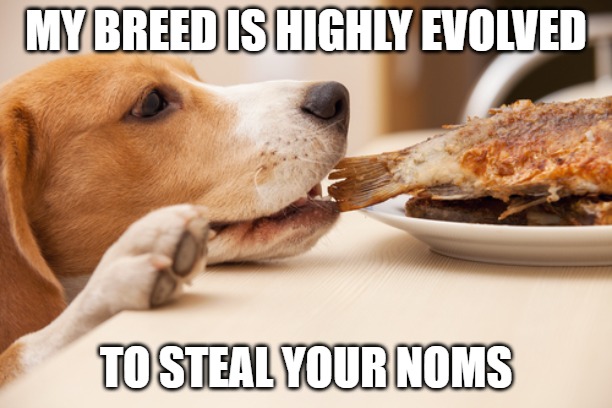
This means that while one pup might be full after a bowl of kibble, another from the same litter might need more. Knowing your dog’s breed and genetics is key when assessing their appetite, which can help you make sure they are getting the right amount of food for a healthy weight.
How DNA Makes Doggos Crave "Dog"nuts
We now know that a majority of dogs in the United States are overweight or obese, but the extra squishiness around your dog’s stomach can cause a myriad of health problems including canine diabetes, heart problems, and arthritis. Lucky for us, modern-day science and technology can help pet parents have access to valuable information when it comes to their dog’s health.
Since 2019, Embark Veterinary’s doggy DNA tests have been able to test for a gene (called Pre-Opiomelanocortin, or POMC for short) that may be causing their dog’s overeating. This helps pet parents make informed lifestyle changes to improve the health of their dogs.
The POMC gene can contribute to obesity in all dog breeds, it specifically affects Labrador Retrievers and Flat Coated Retrievers -- which isn’t a big surprise, anyone who has known a Lab knows they have a big appetite!
Missing Link for Munchies?
A 2016 study from scientists at the University of Cambridge UK showed that Labs aren’t to blame for their perceived gluttony; it’s in their genes. The researchers studied 310 Labradors that were either companion dogs or assistance animals, examining three genes thought to influence canine obesity based on studies in other species. They also assessed the dogs’ eating behavior and body fat levels.
With two of the genes, the researchers didn’t find a link to eating behavior or obesity, but the other one, POMC, was just what they had been looking for. They discovered that dogs missing a small portion of the POMC gene sequence were likely to weigh more and have more body fat and higher levels of food motivation.
The POMC gene codes for two proteins that help the brain regulate appetite, essentially letting your dog know that it’s time to stop eating. It’s believed that with lower levels of these proteins, the “I’m full” message is never received, and the pups continue to feel hungry, even if they’ve just feasted.
In the University of Cambridge study, almost 25% of the Labs had the POMC mutation, which is known as a deletion since the gene is partially or fully missing. However, when it came to the assistance dogs, the number skyrocketed to more than 75%. It’s likely that over time, these dogs have inadvertently been bred to have this mutation; with their high levels of food motivation, they’re easy to train, which essentially makes them better at their job.
Did you know that POMC doesn’t just affect canines! POMC neurons (brain cells that express POMC) play a role in regulating hunger in other species, too, including humans. Research has found that exercise and circadian rhythms impact POMC levels, which in turn has a result on hunger and satiation.
HOW DO I KNOW IF MY DOG HAS THE POMC MUTATION?
Since 2019, Embark’s DNA testing includes the POMC mutation, which is common in. This is possible because it’s a linkage test, meaning Embark has taken advantage of the fact that DNA sequences that are close together on a chromosome tend to be inherited together.
Embark can use genetic variation surrounding a mutation (i.e. “linked” to it) to infer the presence or absence of a mutation of interest. Linkage tests do not directly examine a mutation of interest; therefore, they may not always be perfectly predictive of your dog’s true genotype but Embark’s analysis shows their linkage test is over 98% predictive of POMC genotype.
WHAT SHOULD I DO IF MY DOG HAS THE POMC MUTATION?
Knowing that your dog has the POMC mutation will at the very least help explain their obsession with food. But this result can give you more than a better understanding of your pup’s quirks.
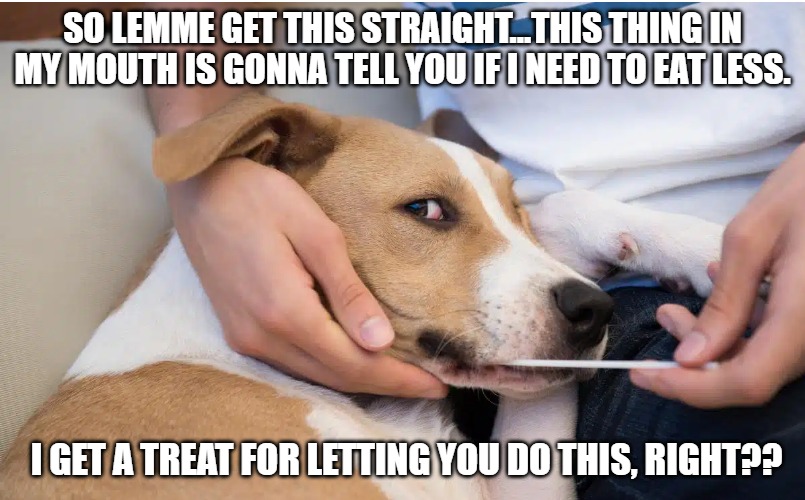
You and your vet can use the information to get proactive about diet and exercise to help prevent them from becoming obese, which increases the risk for orthopedic disease, Type II Diabetes, cardiovascular disease, and cancer.
Still, keep in mind that the POMC mutation is not a guarantee of obesity, nor does it directly cause disease (which is why Embark lists it as a trait rather than a health condition).
This article was updated and expanded by the PetHub team in August 2023. Portions of the original article were posted on Embark’s website in December 2019. More information was added from an Embark press release from 2019.



